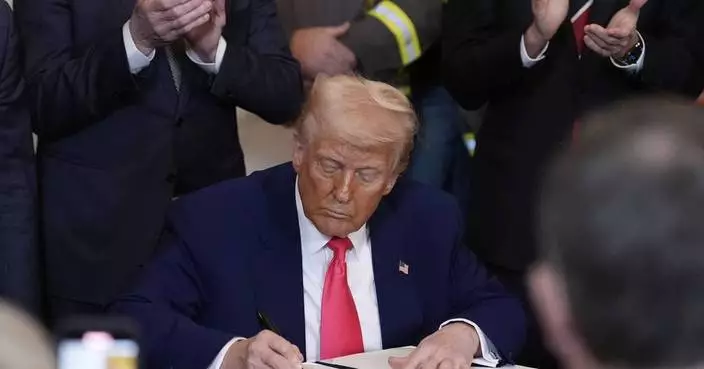ATLANTA (AP) — U.S. Rep. Nikema Williams stepped down as chair of the Democratic Party of Georgia on Monday, five months after Kamala Harris' loss to Donald Trump in the southern swing state spotlighted discontent with her leadership.
Williams' exit is one of several among Democratic parties as disgruntled partisans seek change after the electorate embraced Trump's return to the presidency.
Several Georgia Democrats questioned whether someone could serve effectively as an elected official and party chair. The decision comes after the party's state committee voted Saturday to make the position paid and full-time. Williams agreed to the change, leading her to step down without a vote on her leadership.
“For the party to meet the moment while honoring its commitment to working people, the role of chair cannot remain an uncompensated volunteer position,” Williams said in a statement.
Williams also withdrew her bid in February for vice chair of civic engagement and voter participation for the Democratic National Committee.
The resignation came months after Democratic U.S. Sen. Jon Ossoff reportedly urged Williams to resign. Ossoff faces reelection in 2026 and will be a top target nationally for the GOP.
Some state Democratic lawmakers said Ossoff made Williams a scapegoat for the Democratic Party's deeper messaging problems.
Williams was a lobbyist for Planned Parenthood Southeast when she joined party leadership, becoming first vice chair in 2011. She was elected as a state senator in 2017 and party chair in 2019.
After U.S. Rep John Lewis died in July 2020, the party's executive committee selected her to replace Lewis as the nominee, meaning Williams was elected in the strongly Democratic 5th Congressional District without having to win a party primary. Williams has cruised to reelection twice since then.
There had long been some discontent with Williams' leadership of the Georgia party. As a sitting member of Congress, she is legally barred from raising money for the party's state campaign account. Raising money and recruiting candidates are two of the top jobs of any party chair. There were also questions about how much time Williams could devote to being a party chair while also attending to congressional duties.
Although Harris won 75,000 more votes in Georgia in 2024 than Biden won in 2020, she lost the state's 16 electoral votes by 115,000 votes overall, compared to Biden's victory of less than 12,000. That's because Trump won 200,000 more votes than he did in 2020.
The Republican turnout surge was particularly apparent outside metro Atlanta, where the complaints about Williams' leadership have been the loudest. Democrats in those areas are more likely to be dependent on party-raised money and its centrally led and coordinated campaign.
Williams defended her legacy.
“When I was elected to the role of chairwoman in 2019, Georgia was on the cusp of an extraordinary shift that few would buy into," she said. “Through strategic vision, relentless organizing, and an unwavering belief in the power of our people, we turned this state into the battleground it was always meant to be.”
Georgia's Democratic Party will elect a new chair. Until then, first Vice Chair Matthew Wilson will serve as interim chair.
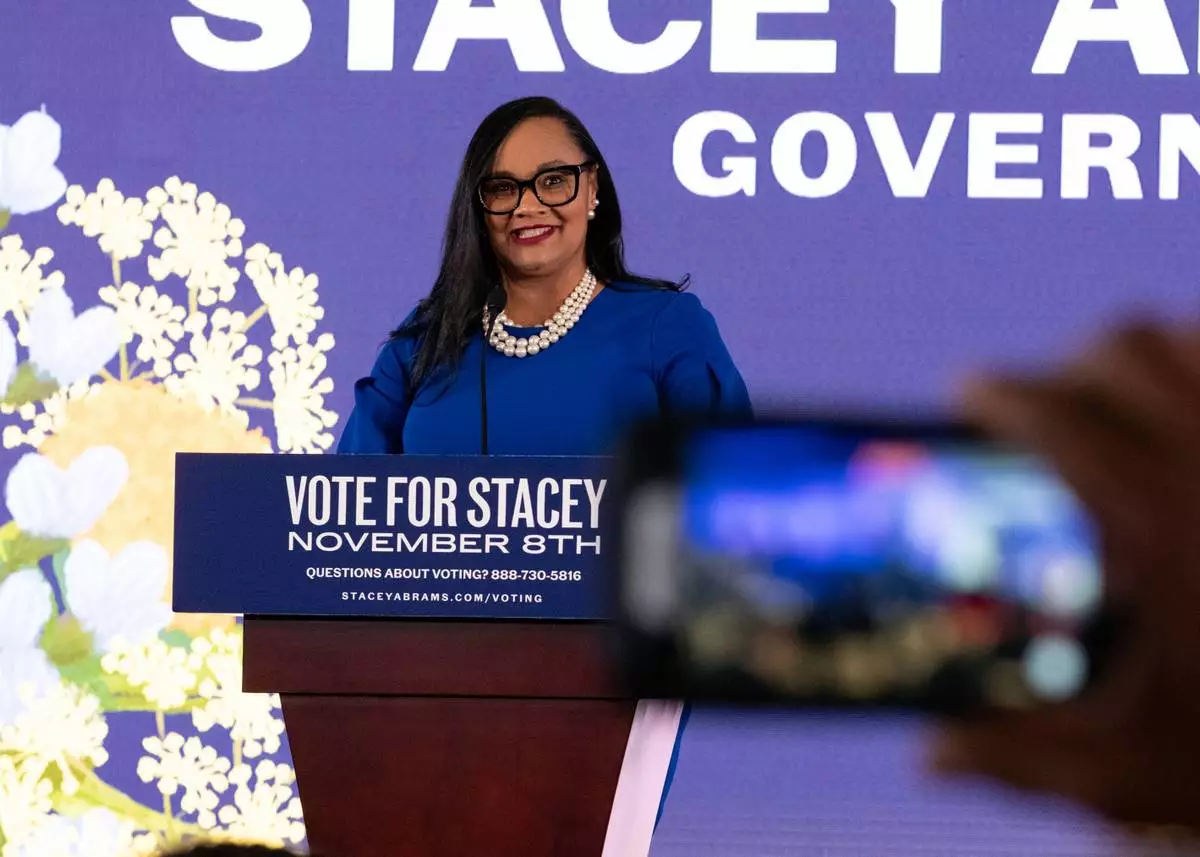
FILE - Rep. Nikema Williams, D-Ga., speaks during an election night event for Democratic candidate for Georgia Governor Stacey Abrams in Atlanta on Tuesday, Nov. 8, 2022. (AP Photo/Ben Gray, file)
NEW YORK (AP) — U.S. stocks on Thursday are giving back some of their historic gains from the day before as Wall Street weighs a global trade war that has cooled in temperature but is still threatening the economy.
The S&P 500 was down 2.3%, a day after surging 9.5% following President Donald Trump’s decision to pause many of his tariffs worldwide. The Dow Jones Industrial Average was down 700 points, or 1.7%, as of 9:35 a.m. Eastern time, and the Nasdaq composite was 2.7% lower.
Even a better-than-expected report on inflation Thursday morning wasn’t enough to get U.S. stocks to add to their surges from the day before, including the S&P 500’s third-best since 1940. Economists said the data wasn’t useful because it offered a view only of the past, when inflation may rise in coming months because of tariffs. A better-than-expected report on joblessness didn’t help much either, with Wall Street’s focus entirely on what’s to come.
“Trump blinks,” UBS strategist Bhanu Baweja said about the president’s decision on tariffs, “but the damage isn’t all undone.”
Trump has focused more on China, raising his tariffs on products coming from the world’s second-largest economy to 125%. Even if that were to get negotiated down to something like 50%, and even if only 10% tariffs remained on other countries, Baweja said the hit to the U.S. economy could still be large enough to hurt expected growth for upcoming U.S. corporate profits.
China, meanwhile, has been reaching out to other countries around the world in hopes of forming a united front against Trump. The European Union, though, on Thursday said it will put its trade retaliation measures on hold for 90 days and leave room for a negotiated solution.
Trump and his Treasury secretary, Scott Bessent, sent a clear message to other countries Wednesday after announcing their tariff pause: “Do not retaliate, and you will be rewarded.”
That has many on Wall Street prepared for still more wild swings to come in the market, after the S&P 500 at one point nearly dropped into a “bear market” by almost closing 20% below its record. Often, the whipsaw moves had come not just day to day but also hour to hour. The S&P 500 still remains below where it was when Trump announced his sweeping set of tariffs last week on “Liberation Day.”
“Everything is still very volatile, because with Donald Trump, you don’t know what to expect,” said Francis Lun, chief executive of Geo Securities. “This is really big uncertainty in the market. The threat of recession has not faded.”
One encouraging signal, though, is coming from the bond market where stress seems to be easing a bit.
Big jumps for Treasury yields earlier this week had rattled the market, so much that Trump said Wednesday he had been watching how investors were “getting a little queasy.”
Several reasons could have been behind the sharp, sudden rise, including hedge funds having to sell their Treasurys in order to raise cash or investors outside the United States dumping their U.S. investments because of the trade war. Regardless of the reasons behind it, higher yields on Treasurys crank up pressure on the stock market and push rates higher for mortgages and other loans for U.S. households and businesses.
But the 10-year Treasury yield has calmed over the last day and was sitting at 4.31%. That’s after it had shot up to nearly 4.50% Wednesday morning from just 4.01% at the end of last week.
In stock markets abroad, indexes rallied across Europe and Asia in their first chances to trade following Trump’s pause. Japan’s Nikkei 225 surged 9.1%, South Korea’s Kospi leaped 6.6% and Germany’s DAX returned 5.6%.
AP Business Writers Yuri Kageyama and Matt Ott contributed.
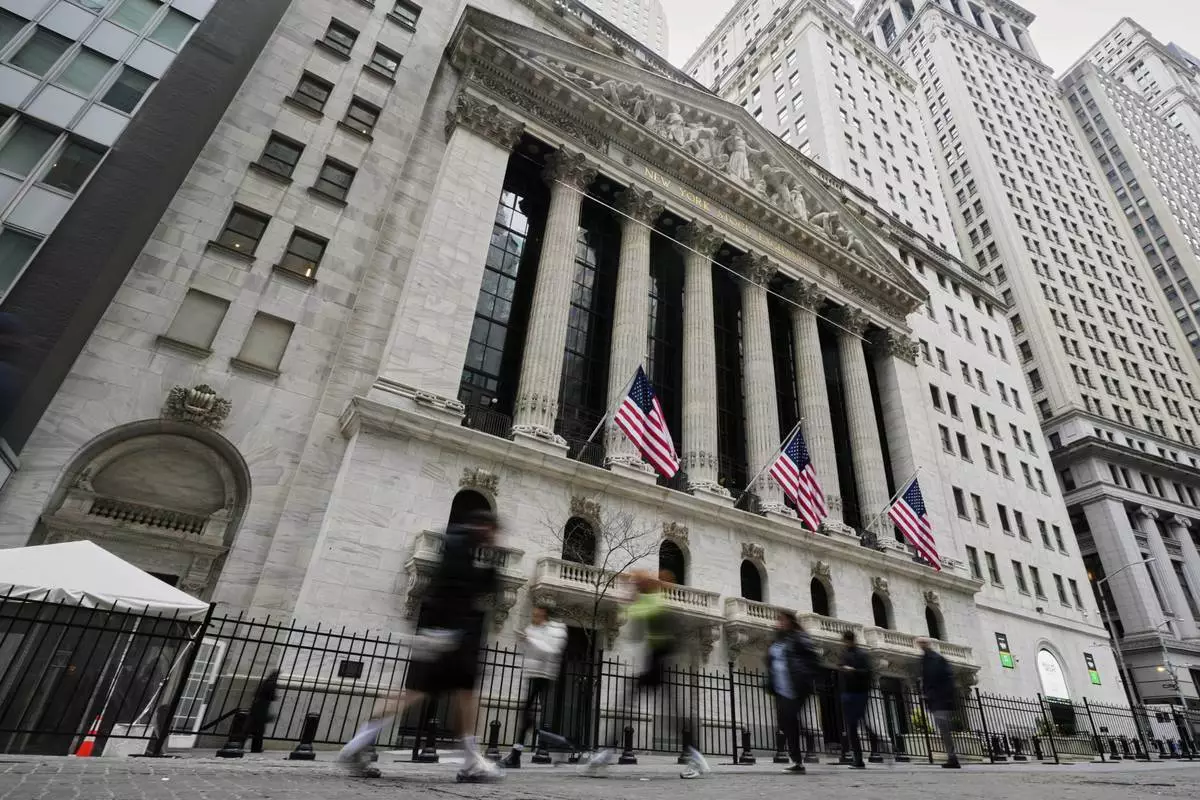
People walk by the New York Stock Exchange, Thursday morning, April 10, 2025. (AP Photo/Richard Drew)
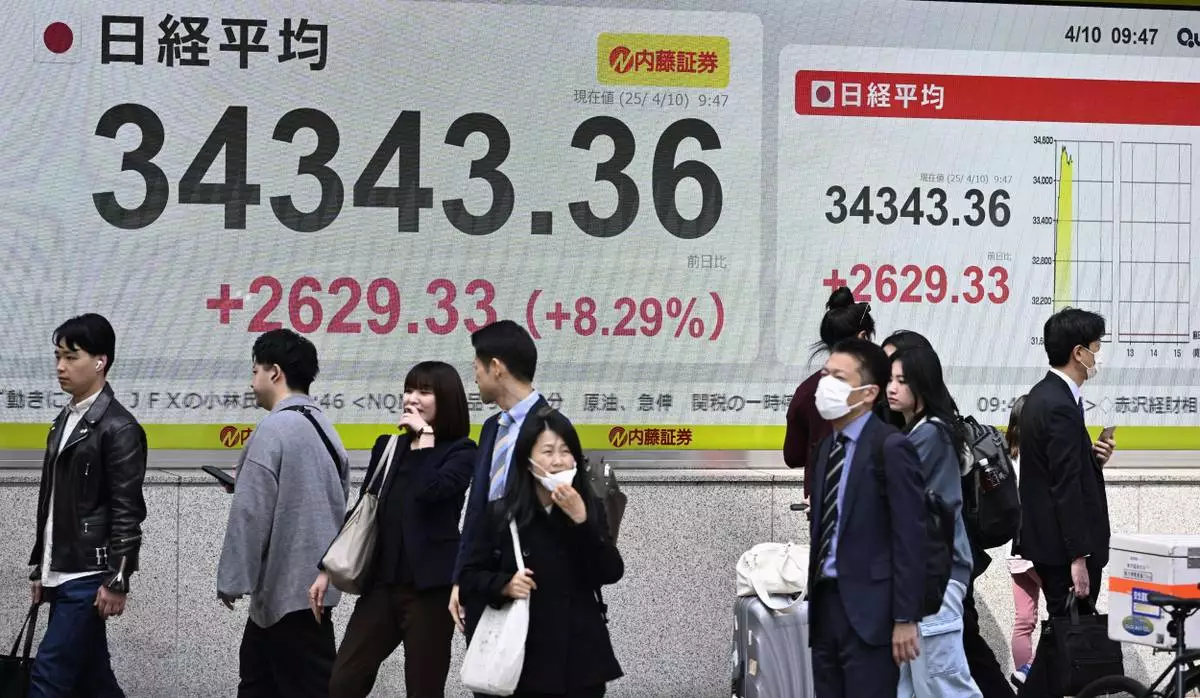
People walk by an electronic board showing Japan's Nikkei 225 index at a securities firm in Tokyo Thursday, April 10, 2025. (Kyodo News via AP)
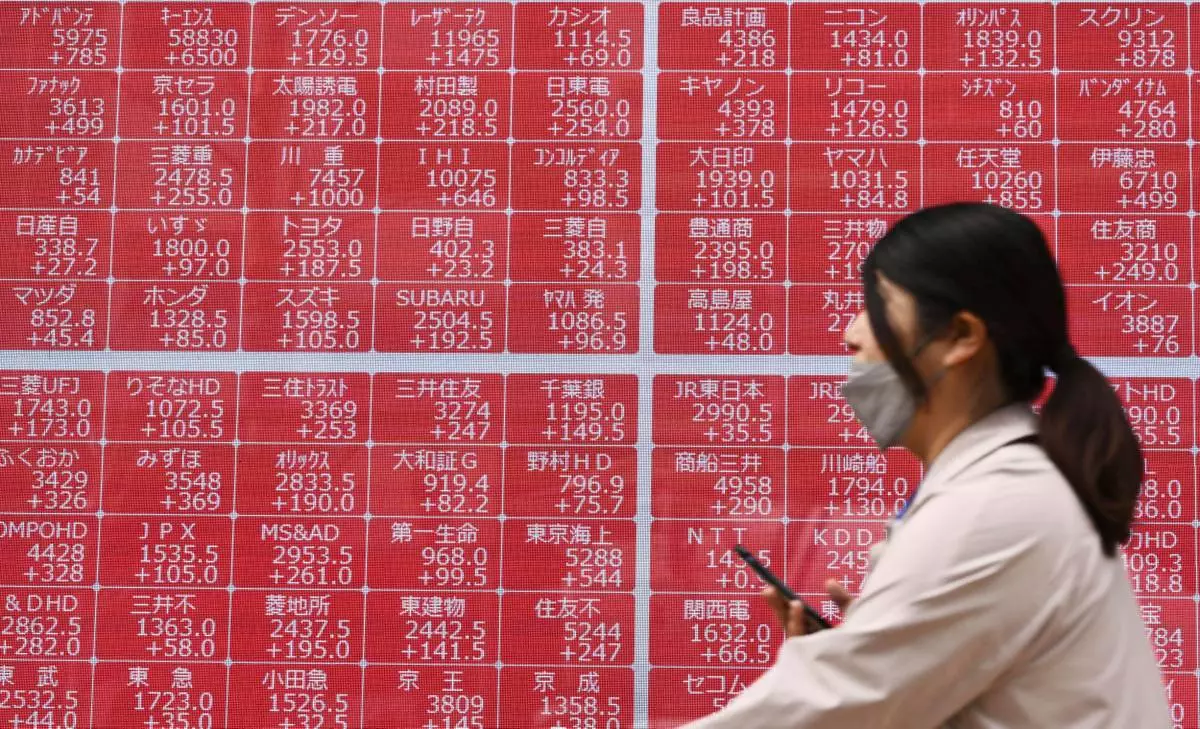
A person walks past an electronic stock board at a securities firm in Tokyo Thursday, April 10, 2025. (Kyodo News via AP)

A currency trader walks by the screens showing the Korea Composite Stock Price Index (KOSPI), left, and the foreign exchange rate between U.S. dollar and South Korean won at a foreign exchange dealing room in Seoul, South Korea, Thursday, April 10, 2025. (AP Photo/Lee Jin-man)

A currency trader watches computer monitors at a foreign exchange dealing room in Seoul, South Korea, Thursday, April 10, 2025. (AP Photo/Lee Jin-man)

A currency trader walks by the screens showing the Korea Composite Stock Price Index (KOSPI), left, the foreign exchange rate between U.S. dollar and South Korean won and the Korean Securities Dealers Automated Quotations (KOSDAQ) at a foreign exchange dealing room in Seoul, South Korea, Thursday, April 10, 2025. (AP Photo/Lee Jin-man)

A currency trader prepares to work near the screens showing the Korea Composite Stock Price Index (KOSPI) and the foreign exchange rate between U.S. dollar and South Korean won at a foreign exchange dealing room in Seoul, South Korea, Thursday, April 10, 2025. (AP Photo/Lee Jin-man)

A currency trader watches computer monitors near the screen showing the foreign exchange rate between U.S. dollar and South Korean won at a foreign exchange dealing room in Seoul, South Korea, Thursday, April 10, 2025. (AP Photo/Lee Jin-man)
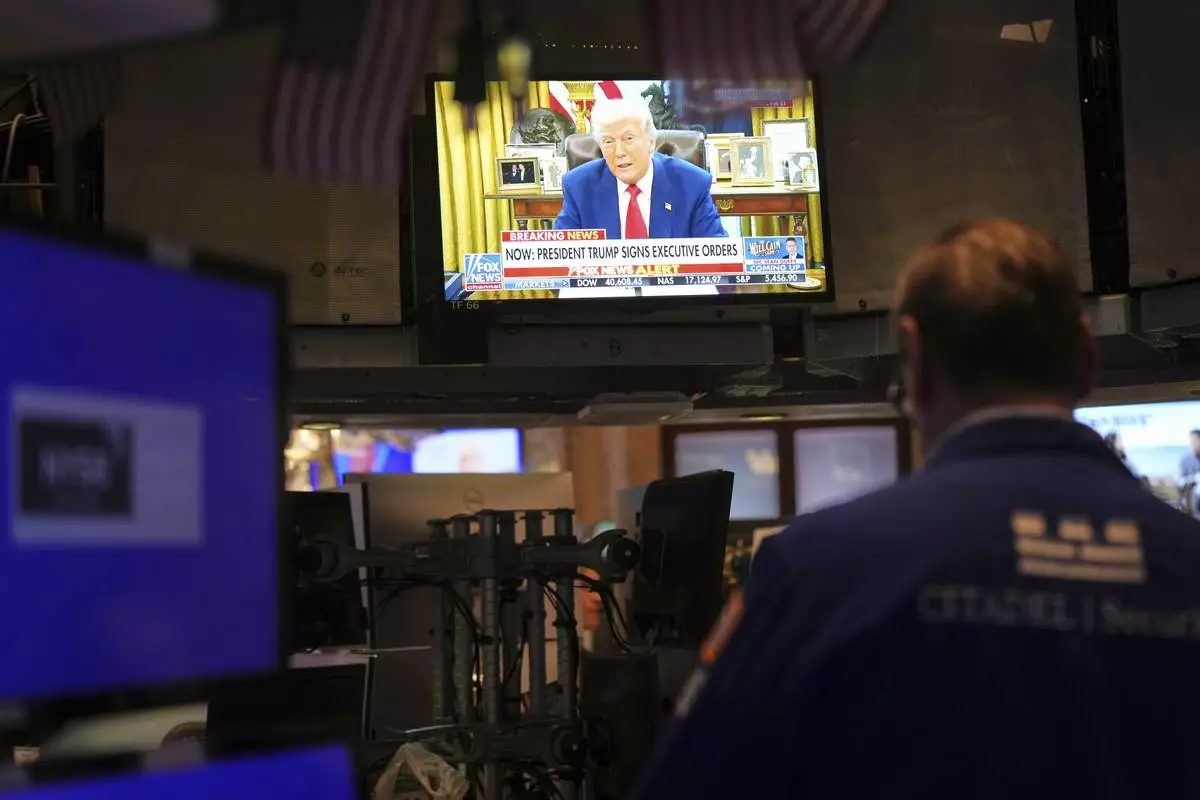
President Donald Trump is displayed on a television on the floor at the New York Stock Exchange in New York, Wednesday, April 9, 2025. (AP Photo/Seth Wenig)
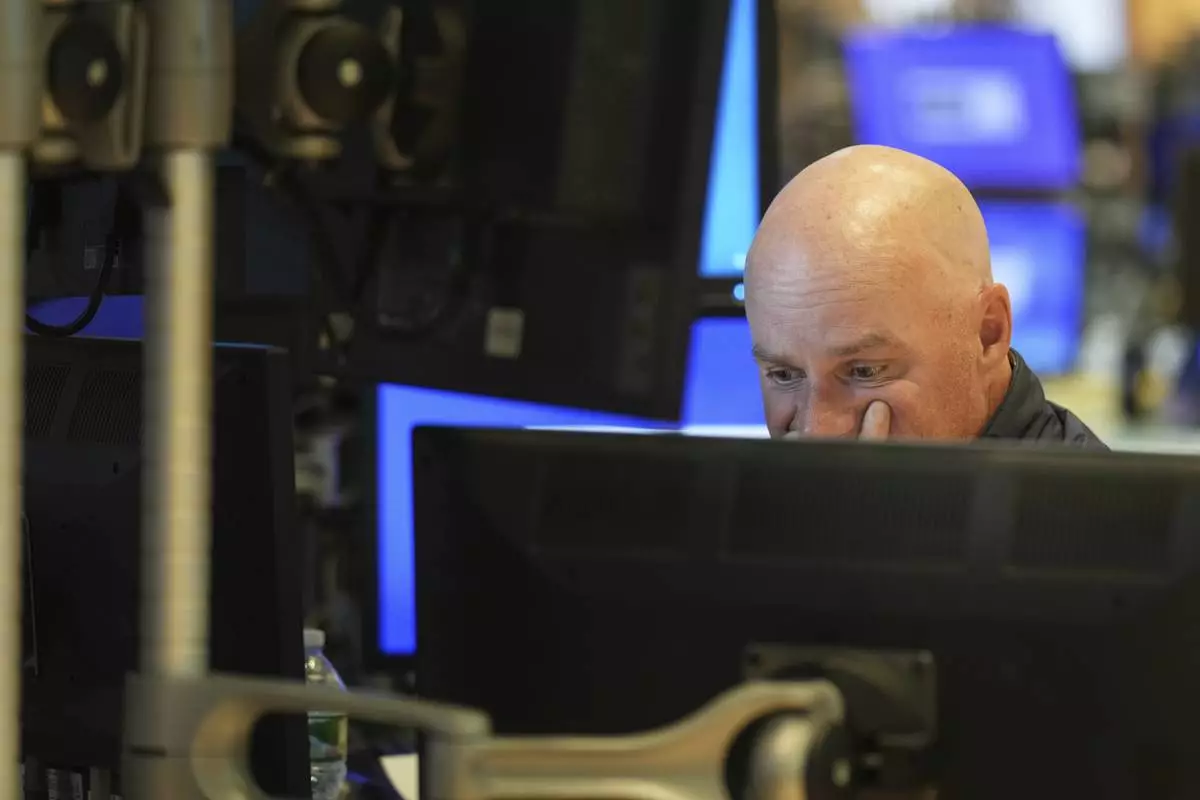
A traders works on the floor at the New York Stock Exchange in New York, Wednesday, April 9, 2025. (AP Photo/Seth Wenig)














